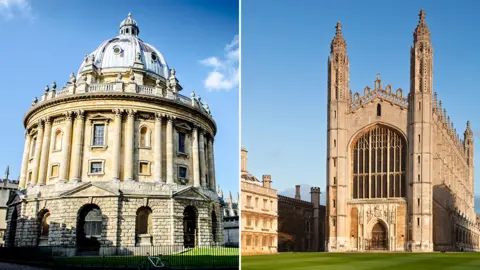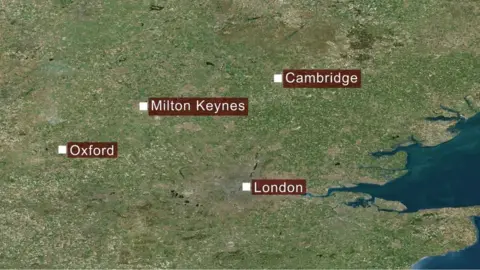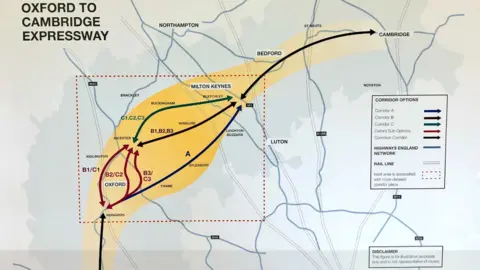Oxford-Cambridge Arc: Row over central England mega-plan
 Getty Images
Getty ImagesA controversial mega-development of homes, offices and roads across central England is being backed by the Transport Secretary, Chris Grayling.
Up to a million new homes could be built along the Oxford, Milton Keynes, Northampton and Cambridge arc.
A new expressway would also shorten journey times from East to West.
Government advisers say the developments are needed to safeguard the booming economies of the UK’s science and technology hub.
But environmentalists argue that the mega-plan will ruin green space the size of Birmingham. And they ask if wealthy towns need to become ever more rich.
 BBC/Vizmaps
BBC/VizmapsThe plan from the National Infrastructure Commission (PDF) includes the re-opening of the previously closed Oxford to Cambridge railway. That element is supported by the government and campaigners alike.
But environmentalists are opposing the expressway, and the scale of the housing development.
They say the road will generate traffic and lead to even more congestion in the long term. They note that the preferred transport in Oxford and Cambridge is the bicycle.
Mr Grayling told BBC News: "If we don't improve road connections in what is a busy part of the country, the existing roads will become more and more congested. There will also be local transport improvements."
The road would improve air quality in snarled-up towns, he added.
 Highways England
Highways EnglandAsked whether it was possible for the UK to continue expanding transport systems in the light of climate change obligations, Mr Grayling said the government had to strive for increased growth: "We see the development of the corridor for economic and housing is essential."
He agreed there were clearly limits as to how many new roads could physically be built, especially along the south coast. But said this didn’t yet apply to central England.
Transport experts say new roads generate more traffic, but when asked what happens if and when the expressway fills up, Mr Grayling replied: "The expressway is intended to provide relief to smaller towns that get congested."
The Chancellor is due to respond to the expressway proposal in Monday’s Budget, but green campaigners are angry that the issue has received no formal public consultation, environmental assessment or parliamentary enquiry.
'Growth race'
In his column, the environmentalist George Monbiot said: “In 30 years, if this scheme goes ahead, (Oxfordshire) must build as many new houses, and the infrastructure, public services and businesses required to support them, as have been built in the past 1,000. A million new homes amounts, in effect, to an Oxford-Cambridge conurbation.
"But none of this is up for debate. By the time we are asked for our opinion, there will be little left to discuss but the colour of the road signs.
"Is continued growth, in one of the wealthiest regions of the world, desirable? If it is desirable, does it outweigh the acceleration of climate breakdown the scheme will cause? When air pollution already exceeds legal limits, are new roads and their associated infrastructure either appropriate or safe? And are we really engaged in a race with other nations, in which being “left behind” is something to be feared?"
A spokesman for the National Infrastructure Commission said: “Our recommendations come with the clear condition that new schemes should not compromise the high-quality natural environment for existing and future residents, and do not need to involve any changes to existing green belt protections.
“In fact, our report made clear the need for significant investment in landscape improvements, affordable housing and sustainable transport. These changes are vital to make the most of the area’s economic potential and the contribution it makes to the wider UK economy."
